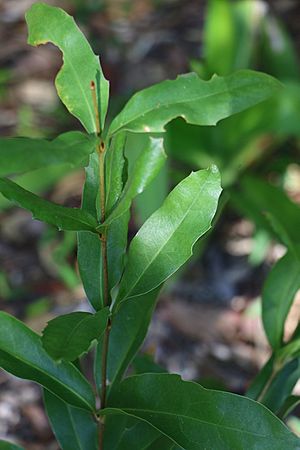Macadamia jansenii facts for kids
Quick facts for kids Macadamia jansenii |
|
|---|---|
 |
|
| Scientific classification | |
| Genus: |
Macadamia
|
| Species: |
jansenii
|
The Macadamia jansenii is a very rare and poisonous tree found only in Queensland, Australia. It belongs to the same plant family as the well-known macadamia nut tree. This special tree was only officially named as a new species in 1991.
Scientists first learned about it in 1983. A sugarcane farmer and amateur botanist named Ray Jansen discovered it. He lived in South Kolan in Central Queensland.
Contents
What is the Macadamia Jansenii?
This tree is an evergreen plant. This means it keeps its leaves all year round. It usually grows with many stems and can reach 6 to 9 meters tall. Its leaves have smooth edges and often grow in groups of three.
Its Unique Nuts
The Macadamia jansenii produces small nuts. They are about 11 to 16 millimeters wide. These nuts have a smooth, hard, brown shell. Inside, there is a creamy, round kernel. However, these kernels are very bitter and cannot be eaten. They are actually poisonous!
Where Does It Live?
This tree is extremely rare. It was first found as a single group of about 60 plants. These plants were growing in Eastern Australia.
In 2018, about 60 more mature Macadamia jansenii trees were discovered. Sadly, about a quarter of these new trees were destroyed. This happened during the big bush fires of 2019.
Protecting This Rare Tree
Today, there are only about 100 known Macadamia jansenii trees left in the wild. All of them grow in Bulburin National Park. This park is located near Miriam Vale in Queensland.
Scientists are working hard to protect this species. They have created an "insurance population" of these trees. This means they have grown new trees from cuttings. These young trees are kept safe at the Tondoon Botanic Gardens. This garden is near Gladstone.
Studying Its DNA
Scientists have also studied the tree's genome. A genome is like a complete set of instructions for building a living thing. By studying its DNA, scientists can learn a lot. They want to understand how small populations of plants survive. This research can also help protect other rare plants. It can even help make sure we have enough food in the future.

